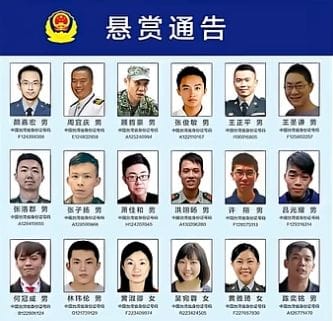Xiamen Police Offer Rewards for Information on 18 Taiwan Psychological Warfare Officers
The Xiamen Public Security Bureau is actively seeking information on 18 Taiwanese psychological warfare officers accused of subversive acts that fuel cross-strait tensions.

Understanding the Situation: A Cross-Strait Concern
Recently, the Xiamen Municipal Public Security Bureau in Fujian Province made a startling announcement that has caught the attention of many observers of the China-Taiwan relationship. They have offered rewards for any information regarding 18 key members of Taiwan's military psychological warfare units, accusing them of engaging in illegal and subversive activities. This development raises important questions about the ongoing psychological games being played across the Taiwan Strait and the broader implications for regional stability. 😟
Who Are These 18 Officers and What Are They Accused Of?
The authorities have publicly named these individuals, listing their photos and identification details—a rare and bold move. The group is alleged to belong to Taiwan’s Political Warfare Bureau’s Psychological Warfare Brigade, which reportedly operates multiple squadrons responsible for diverse activities including intelligence gathering, information warfare research, tactical psychological warfare, and public opinion manipulation.
According to the Xiamen police, these officers have allegedly:
- Created websites aimed at smearing and attacking opposing views.
- Developed ‘reactionary’ games to incite secessionist sentiments among the Taiwanese public.
- Fabricated and disseminated audio-visual content to confuse and mislead opinions.
- Operated ‘reactionary’ radio stations designed to influence audiences.
- Mobilized external forces to manipulate public opinion towards promoting Taiwan independence.
Clearly, these allegations suggest a coordinated campaign intended to deepen divisions between Taiwan and the mainland, foster separatist attitudes, and destabilize the status quo. This raises a serious concern about the methods and scope of psychological warfare in modern conflicts—where perception and narrative control can be as powerful as military might. 🎭
Why Does This Matter to Both Sides of the Strait?
The strife between China and Taiwan continues to be one of the most sensitive geopolitical issues in East Asia. The use of psychological warfare hints at a covert battleground beyond traditional military measures, where the ‘hearts and minds’ of people become the primary objective.
The public naming of these individuals by Chinese authorities is more than just a security move; it’s a signal to Taiwan’s population and external observers that such tactics will not be tolerated and will be aggressively countered. Moreover, the police hope Taiwanese citizens will actively provide clues—a call for popular involvement that emphasizes the seriousness with which Beijing views this issue.
But how effective are such rewards and public notices in combating psychological operations? Will it discourage subversive activities, or might it further inflame tensions, prompting a tit-for-tat cycle of accusations and countermeasures? These questions are critical to consider as we watch these developments unfold. 🤔
Looking Ahead: The Broader Implications of Psychological Warfare
The spotlight on these 18 officers highlights a more extensive, and perhaps underappreciated, front of conflict: the battle for informational and psychological supremacy. As technology advances, so do the tools and strategies of psychological warfare.
The accusations include the use of gaming and multimedia content as vectors for political messaging, reflecting how modern warfare can penetrate daily life and entertainment. This convergence of culture, tech, and security policy is a growing challenge in our interconnected world.
Ultimately, this situation forces us to ask: How do societies safeguard themselves against manipulation while maintaining openness and freedom? How do governments balance security concerns with civil liberties? And crucially, what role do the people caught in the middle play in shaping or disrupting divisive narratives? 🤨
These are not just questions for China and Taiwan but for all nations grappling with the rising tide of psychological operations in the digital age.




